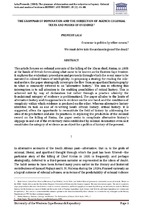The grammar of domination and the subjection of agency: colonial texts and modes of evidence
Abstract
This article focuses on colonial accounts of the killing of the Xhosa chief, Hintsa, in 1835 at the hands of British forces along what came to be known as the Eastern Cape frontier. It explores the evidentiary procedures and protocols through which the event came to be narrated in colonial frames of intelligibility. In proposing a strategy for reading the colo¬nial archive, the paper strategically interrupts the flow from an apartheid historiography to what is commonly referred to as "alternative history." The aim in effecting this interrup¬tion is to call attention to the enabling possibilities of critical history. This is achieved not by way of declaration but rather through a practice whereby the foundational category of evidence is problematized. The paper alludes to the limits of alternative history and its approaches to evidence on the one hand, and the conditions of complicity within which evidence is produced on the other. Whereas alternative history identifies its task as one of re-writing South African history, critical history, it is suggested, offers the opportunity to reconstitute the field of history by addressing the sites of its production and also its prac¬tices. In exploring the production of the colonial record on the killing of Hintsa, the paper seeks to complicate alternative history's slippage in and out of the evidentiary rules estab¬lished by colonial domination even as it constitutes the category of evidence as an object for a politics of history of the present.

